英语七年级“目标导引教学”导学案 M5语法课
- 格式:docx
- 大小:13.55 KB
- 文档页数:4
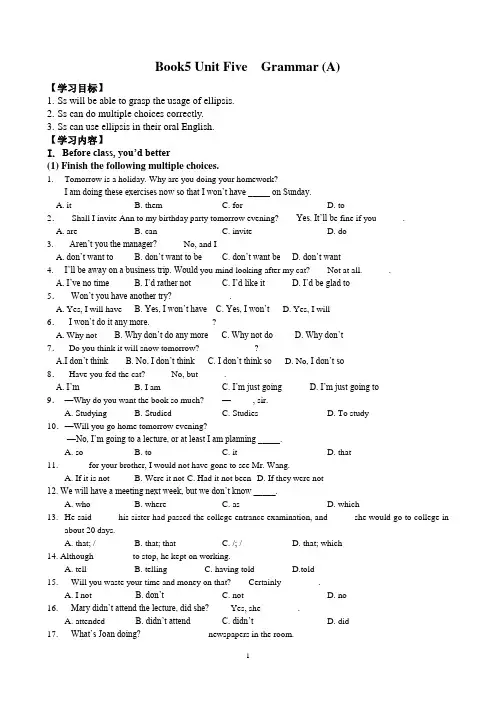
Book5 Unit Five Grammar (A)【学习目标】1.Ss will be able to grasp the usage of ellipsis.2.Ss can do multiple choices correctly.3.Ss can use ellipsis in their oral English.【学习内容】I. Before class, you’d better(1) Finish the following multiple choices.1. ---Tomorrow is a holiday. Why are you doing your homework?---I am doing these exercises now so that I won’t have _____ on Sunday.A. itB. themC. forD. to2.----Shall I invite Ann to my birthday party tomorrow evening? ---Yes. It’ll b e fine if you______.A. areB. canC. inviteD. do3. ---- Aren’t you the manager? ---- No, and I______A. don’t want toB. don’t want to beC. don’t want beD. don’t want4. ---I’ll be away on a business trip. Would you mind looking after my cat? ---Not at all.______.A. I’ve no timeB. I’d rather notC. I’d like itD. I’d be glad to5.--- Won’t you have another try? ---- ________.A. Yes, I will haveB. Yes, I won’t haveC. Yes, I won’tD. Yes, I will6.---I won’t do it any more. -----_______?A. Why notB. Why don’t do any moreC. Why not doD. Why don’t7.---Do you think it will snow tomorrow? ----______?A.I don’t thinkB. No, I don’t thinkC. I don’t think soD. No, I don’t so8.---Have you fed the cat? ---No, but______.A. I’mB. I amC. I’m just goingD. I’m just going to9.—Why do you want the book so much? —_____, sir.A. StudyingB. StudiedC. StudiesD. To study10.—Will you go home tomorrow evening?—No, I’m going to a lecture, or at least I am planning _____.A. soB. toC. itD. that11. _____ for your brother, I would not have gone to see Mr. Wang.A. If it is notB. Were it notC. Had it not beenD. If they were not12. We will have a meeting next week, but we don’t know _____.A. whoB. whereC. asD. which13. He said _____ his sister had passed the college entrance examination, and _____ she would go to college inabout 20 days.A. that; /B. that; thatC. /; /D. that; which14. Although ________ to stop, he kept on working.A. tellB. tellingC. having toldD.told15. --- Will you waste your time and money on that? --- Certainly ________.A. I notB. don’tC. notD. no16. --- Mary didn’t attend the lecture, did she? --- Yes, she ________.A. attendedB. didn’t attendC. didn’tD. did17. --- What’s Joan doing? --- _________ newspapers in the room.A. She readingB. She readsC. To readD. Reading18. _________ always succeed.A. Honest and clever studentsB. Students who honest and cleverC. Honest students and cleverD. Students are honest and clever19. --- Can you climb that tree, my boy? --- __________ ?A. IB. MyselfC. MineD. Me20. Some people are against the plan but _______ support it.A. any moreB. many moreC. much moreD. no more21. --- Why not go and have dinner in a restaurant? --- _________. It’s too expensive.A. Why notB. I agreeC. I’m afraid notD. I’m sure22. ---I’ll be away for a business trip. Would you mind looking after my cat? ---Not at all. _____.A. I’ve no timeB. I’d rather notC. I’d like toD. I’d be happy to23. . You are standing too near the camera. Can you move ______.A. a bit farB. a little fartherC. a bit of fartherD. a little far24. ____ I had time, I would have run round that lake again.A. IfB. UnlessC. HadD. When25. ---What do you think made Mary so upset? --- _____ her bicycle.A. As she lostB. LostC. Because of losingD. Losing26.---“I slipped on the stairs. I think my arm is broken.”---“Oh! I _______.”A. do not hope toB. do not hopeC. hope not soD. hope not27. ---“Is Professor Tate very sick?” ---“I’m afraid _______.”A. soB. thisC. toD. that28. I hope there are enough glasses for each guest to have _______.A. itB. thoseC. themD. one29. The boy wanted to ride his bicycle in the street, but his mother told him _______.A. not toB. not to doC. not do itD. do not do30.---“Do you think it’s going to rain over the weekend?” ---“_______.”A. I don’t believeB. I don’t believe itC. I believe not soD. I believe not31.---“Don’t forget to come to my birthday party tomorrow.” ---“_______.”A. I don’tB. I won’tC. I can’tD. I haven’t32. ---“I’ll be away on business trip. Would you mind looking after my cat?” ---“Not at all. _______.”A. I’ve no timeB. I’d rather notC. I’d like itD. I’d be happy to33.---“Why don’t we take a little break?”---“Didn’t we just have _______?”A. itB. thatC. oneD. that34.---“There will be a new film on show.”---“I’m afraid _______.”A. soB. maybeC. notD. that35.---“We all hate pollution.” ---“ _______.”A. Yes, everyone hatesB. Yes, everyone doesC. No, I like notD. No, I don’t36. ---Could you please spare me some time? I’ve something to talk with you.---Not now, _____ time, perhaps.A. any otherB. someC. otherD. some other37. The students have all made up their minds to gain a high mark ____ difficulties.A. howeverB. whateverC. wheneverD. whichever38. —I feel tired, Dad. — Tired? _____?A. For whatB. For whichC. From whichD. Of what39. — Why not join us in the game? — _________.A. No, you do the sameB. Oh, that’s all rightC. Ok, comingD. Sure, please do40. The boy wanted him to ride his bicycle in the street but his mother told him ______.A. not toB. not to doC. not do itD. do not to41. — Would you like some wine? — Yes, _________.A. littleB. very littleC. a littleD. little bit42. —How long has this book shop been in business? — ____ 1982.A. AfterB. InC. FromD. Since(2) Choose the right words to fill in the blanks.1. There was an accident on the road last night but there was no _____________reported accordingto the latest news.2. First aid can be the first step in the _____________of burns.3. The injured person lay on the ground, _____________heavily.4. The _____________ of the city life forced him to move to the country..5. Did you attend your sister’s wedding _____________when she got married?6. There are several _____________waiting for the injured in the fire.7. She got badly _____________ in the accident and was sent to hospital quickly.8. His _____________ inspired all the teenagers of the country.9. Remember to cover the burned area with a dry and clean _____________.10. It is neither cold nor hot, so it is a _____________day.(3) Finish the following piece of Cloze.After the birth of my second child, I got a job at a restaurant. Having worked with an experienced 1 for a few days. I was 2 to wait tables on my own. All went 3 that first week. When Saturday night came, I was luckily 4 the tables not far from the kitchen.5 , I still felt it a little hard to carry the heavy trays(托盘).Before I knew it, the 6 was full of people. I moved slowly, 7 every step. I remember how 8 I was when I saw the tray stand near the tables; it looked different from the one I was 9 on. It had nice handles, which made it 10 to move around. I was pleased with everything and began to 11 I was natural at this job.Then, an old man came to me and said, “Excuse me, dear, my wife and I loved 12 you work. It seems your tray stand has been very 13 to you, but we are getting ready to 14 now, and my wife needs her 15 back.” At first his 16 did not get across. “What was he talking about!” Then, I got it. I had set my trays on his wife’s orthopedic walker(助步器). I stood frozen as ice, but my face was 17 . I wanted to get into a hole and 18 .Since then, I have learned from many mistakes such as the one I just 19 . I have learned to be more 20 and not to be too sure of myself.1. A. manager B. assistant C. cook D. waitress2. A. promised B. invited C. allowed D. advised3. A. well B. quickly C. safely D. wrong4. A. left B. given C. brought D. shown5. A. Therefore B. However C. Otherwise D. Finally6. A. kitchen B. street C. restaurant D. table7. A. minding B. changing C. taking D. saving8. A. angry B. calm C. sad D. happy9. A. fixed B. trained C. loaded D. waited10. A. slower B. lighter C. quieter D. easier11. A. believe B. agree C. regret D. pretend12. A. letting B. making C. watching D. having13. A. useful B. familiar C. unusual D. interesting14. A. rest B. order C. eat D. leave15. A. bag B. walker C. tray D. coat16. A. idea B. praise C. message D. need17. A. cold B. full of joy C. pale D. on fire18. A. lie B. hide C. defend D. stay19. A. repeated B. discovered C. corrected D. described20. A. careful B. patient C. honest D. practicalII. In class, you’llhave a discussion for the assignments.III. After class, you’d betterreview what you have learned in class.自我评价:我本节课学到了:___________________________________________________________________________________________ ___________________________________________________________________________________________ ___________________________________________________________________________________________ ___________________________________________________________________________________________存在的问题:___________________________________________________________________________________________ ___________________________________________________________________________________________ ___________________________________________________________________________________________ ___________________________________________________________________________________________KEYS:1-5 DDBDD 6-10ACDDB 11-15CBBDC 16-20DD ADB 21-25CDBCD26-30 DADAD 31-35 BDCCB 36-40 DBDCA 41-42 CD1-10 Injury, treatment, bleeding, pressure, ceremony, ambulances, injured, bravery, bandage, mild1. D2. C3. A4. B5. B6. C7. A8. D9. B 10. D11. A 12. C 13. A 14. D 15. B 16. C 17. D 18. B 19. D 20.B。
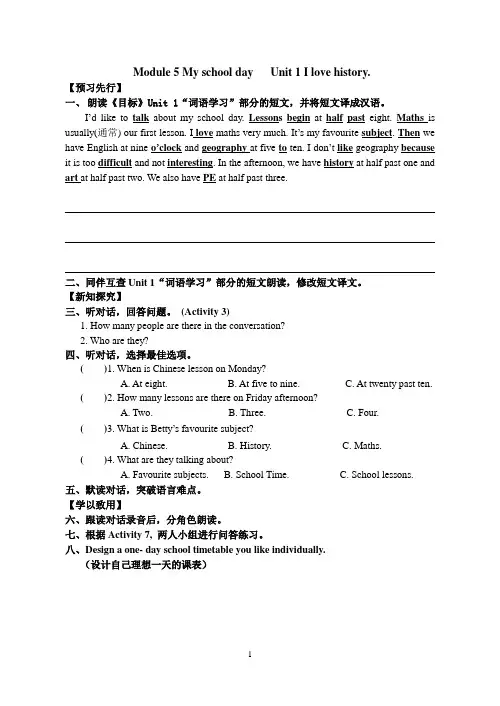
Module 5 My school day Unit 1 I love history.【预习先行】一、朗读《目标》Unit 1“词语学习”部分的短文,并将短文译成汉语。
I’d like to talk about my school day. Lessons begin at half past eight. Maths is usually(通常) our first lesson. I love maths very much. It’s my favourite subject. Then we have English at nine o’clock and geography at five to ten. I don’t like geography because it is too difficult and not interesting. In the afternoon, we have history at half past one and art at half past two. We also have PE at half past three.二、同伴互查Unit 1“词语学习”部分的短文朗读,修改短文译文。
【新知探究】三、听对话,回答问题。
(Activity 3)1. How many people are there in the conversation? ___________________________2. Who are they? _________________________________________四、听对话,选择最佳选项。
( )1. When is Chinese lesson on Monday?A. At eight.B. At five to nine.C. At twenty past ten.( )2. How many lessons are there on Friday afternoon?A. Two.B. Three.C. Four.( )3. What is Betty’s favourite subject?A. Chinese.B. History.C. Maths.( )4. What are they talking about?A. Favourite subjects.B. School Time.C. School lessons.五、默读对话,突破语言难点。
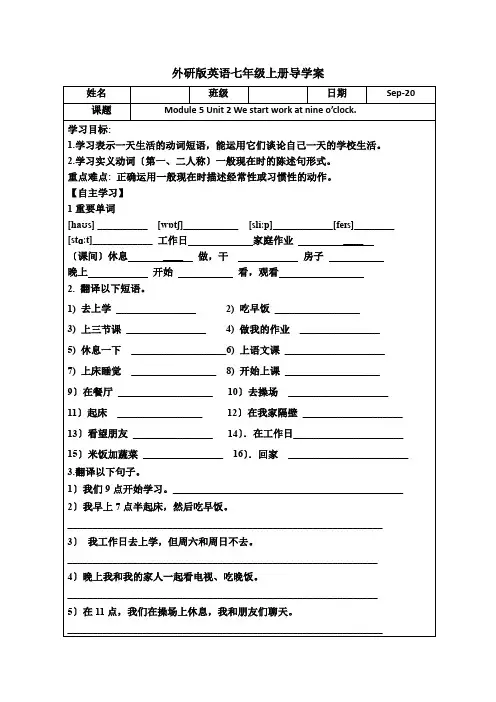
外研版英语七年级上册导学案第二课时一、学习目标1、学习本单元Pronunciation and speaking局部2、学习当主语是一二人称和第三人称复数时行为动词的一般现在时二、学习重点学习当主语是一二人称和第三人称复数时行为动词的一般现在时三、学习难点学习当主语是一二人称和第三人称复数时行为动词的一般现在时课前预习一、使用说明与学法指导1、教材27页上5、6、7题课前同桌互相练习,课上老师教读纠正音标,并抽查学生6、7题的练习情况2、课前预习教材82页内容,行为动词的一般现在时二、教材助读在教材上找到以下句子,熟读以后想想当主语是一二人称和第三人称复数时,行为动词的一般现在时怎么构成的?We have Chinese at eight o’clock.Do you like math? Yes, I do.Do we have maths?No, we don’t.We have art and history, but we don’t have maths.I love history.Lessons begin at eight.They have four lessons in the morning三、预习自测1、读出以下单词的正确发音1)too two blue cool afternoon do school soup2) good book put woman3) talk morning draw four course autumn4) because o’clock what sorry dog hot2、翻译下面的句子1)我们11:00上美术课。
______________________________________________________2)他们9:10上历史课。
______________________________________________________3)我经常和我的朋友谈话。
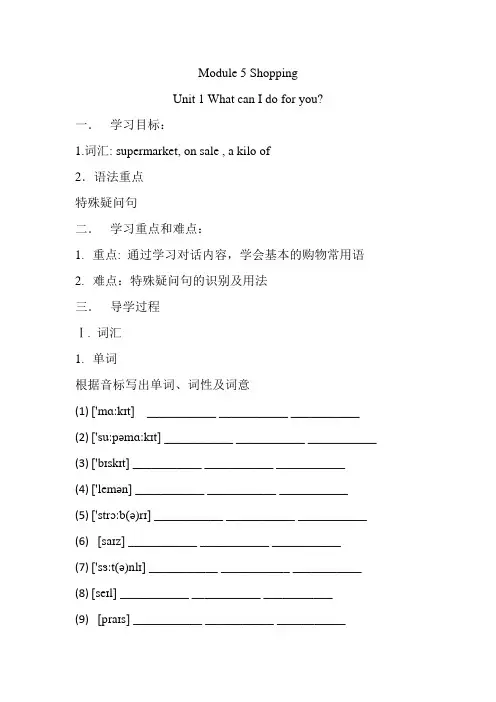
Module 5 ShoppingUnit 1 What can I do for you?一.学习目标:1.词汇: supermarket, on sale , a kilo of2.语法重点特殊疑问句二.学习重点和难点:1. 重点: 通过学习对话内容,学会基本的购物常用语2. 难点:特殊疑问句的识别及用法三.导学过程Ⅰ. 词汇1. 单词根据音标写出单词、词性及词意(1)['mɑːkɪt] ___________ ___________ ___________(2)['suːpəmɑːkɪt] ___________ ___________ ___________(3)['bɪskɪt] ___________ ___________ ___________(4)['lemən] ___________ ___________ ___________(5)['strɔːb(ə)rɪ] ___________ ___________ ___________(6)[saɪz] ___________ ___________ ___________(7)['sɜːt(ə)nlɪ] ___________ ___________ ___________(8)[seɪl] ___________ ___________ ___________(9)[praɪs] ___________ ___________ ___________(10)[freʃ] ___________ ___________ ___________2. 预习对话,试着翻译下列短语(1)什么颜色________________(2)在母亲节________________(3)试穿________________(4)请稍等________________(5)半价________________(6)买下来________________(7)半斤________________Ⅱ.仔细研读下列各句,试着回答后面的问题1.What can I do for you ?此句的同义句为____________________________,此类句子的使用语境都是售货员或者是服务员对顾客说的话。
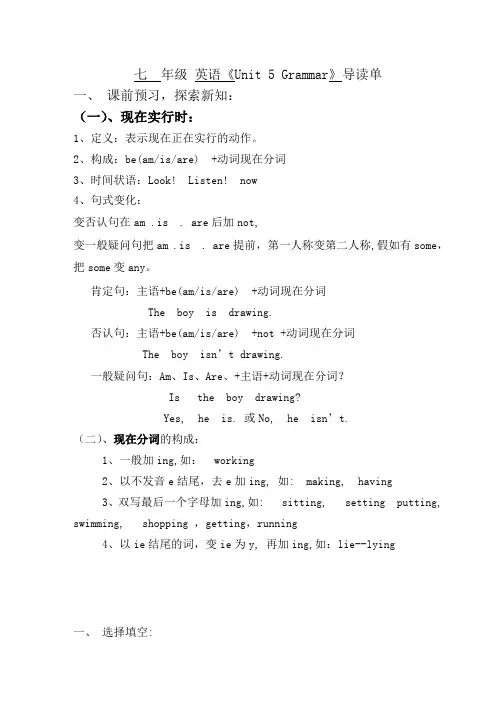
七年级英语《Unit 5 Grammar》导读单一、课前预习,探索新知:(一)、现在实行时:1、定义:表示现在正在实行的动作。
2、构成:be(am/is/are) +动词现在分词3、时间状语:Look! Listen! now4、句式变化:变否认句在am .is . are后加not,变一般疑问句把am .is . are提前,第一人称变第二人称,假如有some,把some变any。
肯定句:主语+be(am/is/are) +动词现在分词The boy is drawing.否认句:主语+be(am/is/are) +not +动词现在分词The boy isn’t drawing.一般疑问句:Am、Is、Are、+主语+动词现在分词?Is the boy drawing?Yes, he is. 或No, he isn’t.(二)、现在分词的构成:1、一般加ing,如: working2、以不发音e结尾,去e加ing, 如: making, having3、双写最后一个字母加ing,如: sitting, setting putting, swimming, shopping ,getting,running4、以ie结尾的词,变ie为y, 再加ing,如:lie--lying一、选择填空:( ) 1. Jenny her homework in the evening.A. doB. doesC. is doingD. to do( ) 2. I love my father. My father , too.A. love meB. love IC. loves meD. loves I ( ) 3. --- is Mary ?--- She is eating a hamburgerA. What, doingB. What, doC. What, doesD. What, to do ( ) 4. The girl is doing homework.A. sheB. myC. she’sD. her( ) 5. --- Are you writing a letter?--- Yes, .A. you areB. I’mC. we areD. I do二、用所给词的正确形式填空:1 He is three ______(month) old.2 He often______(go) to school on foot.3 Listen! Someone _______(sing) in the next room.4 We _____(be) the Smith family.5 My sister _____(sit) beside me now.。
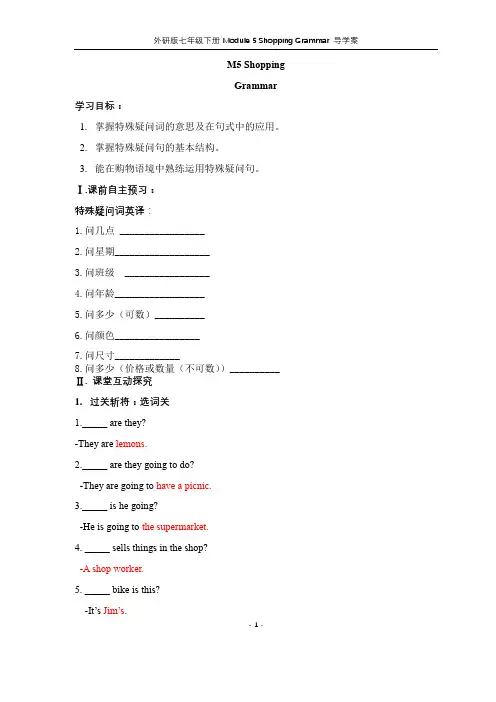
M5 ShoppingGrammar学习目标:1.掌握特殊疑问词的意思及在句式中的应用。
2.掌握特殊疑问句的基本结构。
3.能在购物语境中熟练运用特殊疑问句。
Ⅰ.课前自主预习:特殊疑问词英译:1.问几点 _________________2.问星期___________________3.问班级 _________________4.问年龄__________________5.问多少(可数)__________6.问颜色_________________7.问尺寸_____________8.问多少(价格或数量(不可数))__________ Ⅱ. 课堂互动探究1.过关斩将:选词关1._____ are they?-They are lemons.2._____ are they going to do?-They are going to have a picnic.3._____ is he going?-He is going to the supermarket.4. _____ sells things in the shop?-A shop worker.5. _____ bike is this?-It’s Jim’s.- 1 -6. _____ is your T-shirt?-The red one.7. _____ is Mother’s Day?-It’s in May .8._____ do you choose it?-Because it’s beautiful .9._____ do you get on with your classmates?-very well.2. 过关斩将:选词关1._____ is your dress? –-It’s green.2. _____ does he take? – -large.3. _____ is your sister? -–She is three.3. _____ boxes of strawberries do you want? —Twelve.4. _____ are the shoes? —Fifty yuan.5. _____ does she go shopping? -–Twice a week.3. 语序关:大家来找茬1.What colour she likes?What colour does she like?2. What you can do in the supermarket?What can you do in the supermarket?3. Whose watch are you looking for?Whose watch you are looking for?4. Who does play table tennis well?Who plays table tennis well?4.回答关:眼疾手快( )1. How is your weekend?( )2. What will he do next week?( )3. Who plays table tennis well?( )4. Where are you going tomorrow?( )5. How many books are there ?A. Jim does.B. He will play basketball.C. I'm going to the beach.- 2 -- 3 -D. It is great.E. Six.5. 情景小对话:假如你是超市店员,请用特殊疑问句与顾客对话。
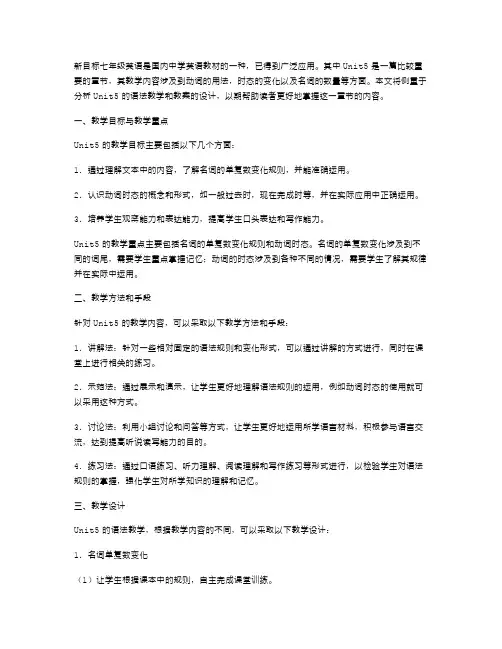
新目标七年级英语是国内中学英语教材的一种,已得到广泛应用。
其中Unit5是一篇比较重要的章节,其教学内容涉及到动词的用法,时态的变化以及名词的数量等方面。
本文将侧重于分析Unit5的语法教学和教案的设计,以期帮助读者更好地掌握这一章节的内容。
一、教学目标与教学重点Unit5的教学目标主要包括以下几个方面:1.通过理解文本中的内容,了解名词的单复数变化规则,并能准确运用。
2.认识动词时态的概念和形式,如一般过去时,现在完成时等,并在实际应用中正确运用。
3.培养学生观察能力和表达能力,提高学生口头表达和写作能力。
Unit5的教学重点主要包括名词的单复数变化规则和动词时态。
名词的单复数变化涉及到不同的词尾,需要学生重点掌握记忆;动词的时态涉及到各种不同的情况,需要学生了解其规律并在实际中运用。
二、教学方法和手段针对Unit5的教学内容,可以采取以下教学方法和手段:1.讲解法:针对一些相对固定的语法规则和变化形式,可以通过讲解的方式进行,同时在课堂上进行相关的练习。
2.示范法:通过展示和演示,让学生更好地理解语法规则的运用,例如动词时态的使用就可以采用这种方式。
3.讨论法:利用小组讨论和问答等方式,让学生更好地运用所学语言材料,积极参与语言交流,达到提高听说读写能力的目的。
4.练习法:通过口语练习、听力理解、阅读理解和写作练习等形式进行,以检验学生对语法规则的掌握,强化学生对所学知识的理解和记忆。
三、教学设计Unit5的语法教学,根据教学内容的不同,可以采取以下教学设计:1.名词单复数变化(1)让学生根据课本中的规则,自主完成课堂训练。
(2)老师可以通过多媒体等手段呈现名词的复数形式,以便加深学生的记忆。
(3)作业布置:完成课后练习册中与名词单复数变化有关的练习。
2.动词时态变化(1)让学生自主复习有关动词时态的相关知识点,包括不同的时态、使用场合以及口语连用等。
(2)通过示范法和讲解法,讲解一些比较难以理解的动词时态及其使用场合。
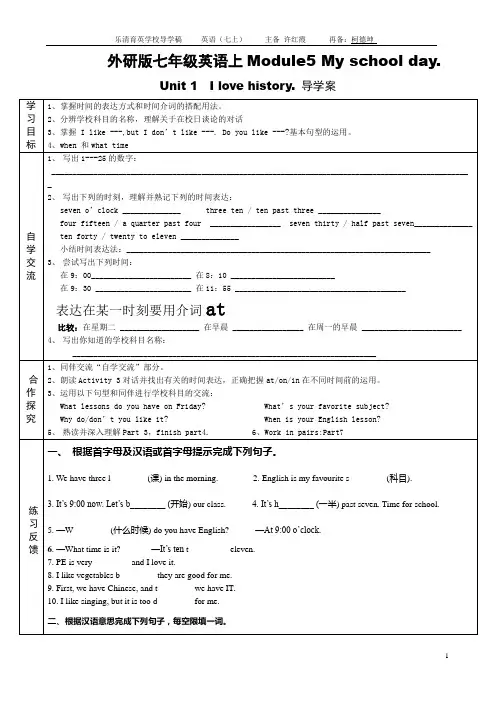
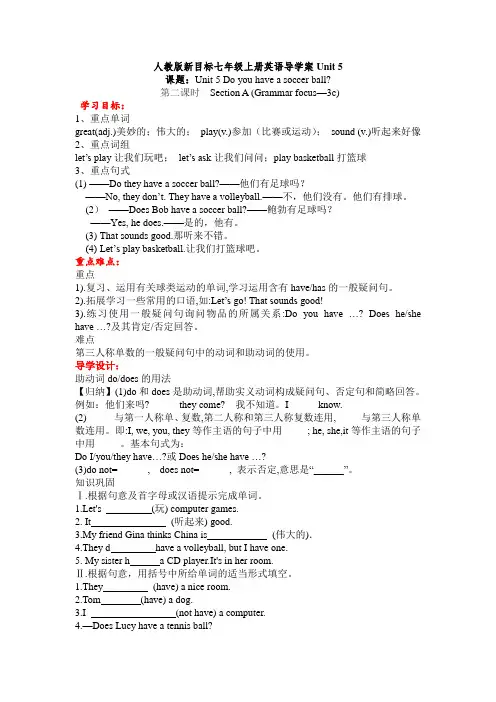
人教版新目标七年级上册英语导学案Unit 5课题:Unit 5 Do you have a soccer ball?第二课时Section A (Grammar focus—3c)学习目标:1、重点单词great(adj.)美妙的;伟大的;play(v.)参加(比赛或运动);sound (v.)听起来好像2、重点词组let’s play让我们玩吧;let’s ask让我们问问;play basketball打篮球3、重点句式(1)——Do they have a soccer ball?——他们有足球吗?——No, they don’t. They have a volleyball.——不,他们没有。
他们有排球。
(2)——Does Bob have a soccer ball?——鲍勃有足球吗?——Yes, he does.——是的,他有。
(3) That sounds good.那听来不错。
(4) Let’s play basketball.让我们打篮球吧。
重点难点:重点1).复习、运用有关球类运动的单词,学习运用含有have/has的一般疑问句。
2).拓展学习一些常用的口语,如:Let’s go! That sounds good!3).练习使用一般疑问句询问物品的所属关系:Do you have …? Does he/she have …?及其肯定/否定回答。
难点第三人称单数的一般疑问句中的动词和助动词的使用。
导学设计:助动词do/does的用法【归纳】(1)do和does是助动词,帮助实义动词构成疑问句、否定句和简略回答。
例如:他们来吗?______they come? 我不知道。
I _____ know.(2) _____与第一人称单、复数,第二人称和第三人称复数连用,_____与第三人称单数连用。
即:I, we, you, they等作主语的句子中用_____; he, she,it等作主语的句子中用_____。
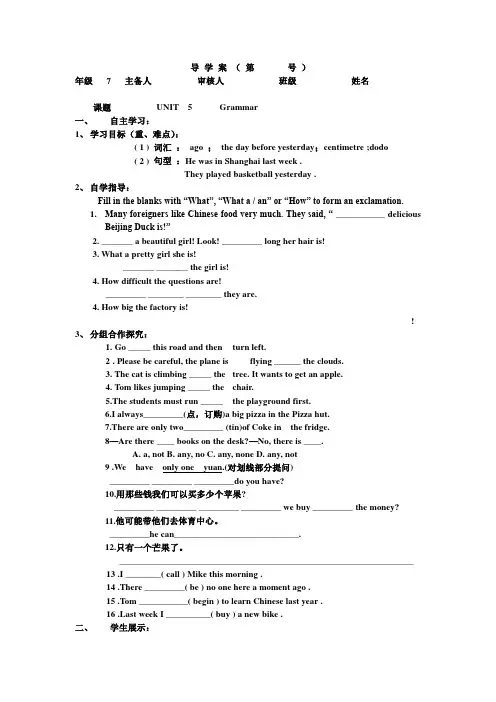
导学案(第号)年级7 主备人审核人班级姓名课题UNIT 5 Grammar一、自主学习:1、学习目标(重、难点):( 1 ) 词汇:ago ;the day before yesterday;centimetre ;dodo( 2 ) 句型:He was in Shanghai last week .They played basketball yesterday .2、自学指导:Fill in the blanks with “What”, “What a / an” or “How” to form an exclamation.1.Many foreigners like Chinese food very much. They said, “ ___________ deliciousBeijing Duck is!”2. _______ a beautiful girl! Look! _________ long her hair is!3. What a pretty girl she is!_______ _______ the girl is!4. How difficult the questions are!_________ ________ ________ they are.4. How big the factory is!!3、分组合作探究:1. Go _____ this road and then turn left.2 . Please be careful, the plane is flying ______ the clouds.3. The cat is climbing _____ the tree. It wants to get an apple.4. Tom likes jumping _____ the chair.5.The students must run _____ the playground first.6.I always_________(点,订购)a big pizza in the Pizza hut.7.There are only two_________ (tin)of Coke in the fridge.8—Are there ____ books on the desk?—No, there is ____.A. a, notB. any, noC. any, noneD. any, not9 .We have only one yuan.(对划线部分提问)_________ _________ _________do you have?10.用那些钱我们可以买多少个苹果?_________ _________ _________ _________ we buy _________ the money?11.他可能带他们去体育中心。
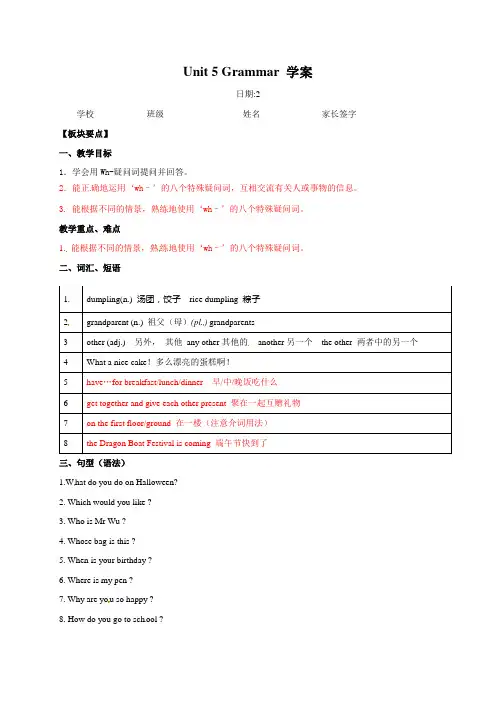
Unit 5 Grammar 学案日期:2学校________ 班级____________ 姓名__________ 家长签字_______ 【板块要点】一、教学目标1.学会用Wh-疑问词提问并回答。
2.能正确地运用‘wh–’的八个特殊疑问词,互相交流有关人或事物的信息。
3. 能根据不同的情景,熟练地使用‘wh–’的八个特殊疑问词。
教学重点、难点1.能根据不同的情景,熟练地使用‘wh–’的八个特殊疑问词。
二、词汇、短语三、句型(语法)1.W hat do you do on Halloween?2. Which would you like ?3. Who is Mr Wu ?4. Whose bag is this ?5. When is your birthday ?6. Where is my pen ?7. Why are yo u so happy ?8. How do you go to sch ool ? (pl.)其他的Unit 5 Grammar学案主备:审核: 日期:学校________ 班级____________ 姓名__________ 家长签字_______ 【课前导学】1. Words and phrases.2.与本课语法关联知识或已学知识归纳。
3. P reparation f or class activities.【课堂学习】Step 1. One-minute talk.Step 2. Watch and find (通过让学生找出Reading中与语法相关的句子)Step 3. Discuss and work out the rules(Group work归纳语法规则, 规则简明扼要,易于记忆。
)Step 4. Pr act ice:(操练任务设计:1.单句练习,2.对话、语篇语法练习)【课后拓展】(两页针对性练习)一、语法习题(必须有)二、短文填空(与本单元相关话题)(必须有)编制要求:梳理知识关联,巧用演绎归纳,观察讨论总结,操练不离语境。
Book 7 Module5 the Past Participle As the Adverbial【学习目标】1.能够正确判断过去分词在句子中所作成分2.能区分现在分词和过去分词作状语【学习指导】认真阅读新新学案部分的理论讲解及例句,独立完成其后的习题以及学案上的练习,有问题的圈出来。
一.知识记忆与理解【基础自学】:阅读以下句子,在过去分词下方划线并思考几个问题;①该词的逻辑主语是谁?@V-ed形式在句中所作什么成分?1 ・ Seen from the top of the building, our school looks beautiful.2.She walked out of the house, followed by her little daughter.3 ・ Bitten by the snake, the man was in danger.4. Tired, he went on working5 ・ Compared with European countries,we still have a long way to go.6. Not invited, he became very upset.二•思维探究与创新探究一:过去分词作状语的用法1 .Discussed many times, the problems were settled at last.2.Done in a hurry, his homework was full of mistakes.pared with Xi,an, Shanghai is larger.4.Not invited, he became very disappointed.5・ Completely rebuilt, the town would not be so interesting.总结:1•过去分词(短语)作状语表示_________ 和 _________ 的动作,其否定形式为 ___________ O2.过去分词(短语)作状语,其逻辑主语一般应与____________________ 一致,且主语是过去分词动作的__________ ,即过去分词与主语之间是____________ 关系,即_________ 关系0探究二:v-ed形式作状语和状语从句的转换仿照例句一完成以下句子:1.Given more attention (If thev had been given more attention) , the cabbages could have grown better.(条件状语)2.When heated ( _____________________________ ) , ice will be changed into water.(时间状语)3.Attracted by the beautiful scenery( _________________________ ), they travel to Guilin .(原因状语)4.The man left his house, followed by his dog(___________________________________________________________________________ ).(伴随状语)总结:动词的过去分词做状语,相当于一个状语从句表___________ , ___________ ,_________ , _________ 等探究三:过去分词化的形容词做状语Lost / Absorbed in deep thought, he didn't hear the sound.Surprised at what had happened, Tom didn' t know what to do.以上两个句子中的过去分词因来源于系表结构,作状语时不表被动而表________________ O类似的过去分词化的形容词还有:探究四:过去分词和现在分词做状语区别Seen from the top of the building, the school looks beautiful.Seeing from the top of the building, we find the school looks beautiful.总结:选用分词作状语时,首先要弄清句子主语和分词之间的逻辑关系,如果句子的主语(分词的逻辑主语)与分词构成_________________________ 关系,则用现在分词作状语,表_____________________ ;如果句子的主语(分词的逻辑主语)与分词构成__________________ 关系,则用过去分词作状语,表_______________________ O三.技能应用与拓展-单句语法填空1 .When _____ (visit)in spring, the hills are covered with flowers.2.. ______ ( know )as one of the loveliest places in China, Yunnan is nowvisited by many tourists.3._ (lose)in the tiny streets, we decides to ask for help.4.If ____ (give )something you don' t want to eat, just refuse politely.5.Time, ____ (use)correctly, is money in the bank.6._____ (found) in 1636, Harvard is one of the most famous universitiesin the United States.(00J上海)7._____ (raise) in the poorest area , he had a long, hard road tobecoming a football star. (2015 重庆)8.1f _________ (accept) for the job, you' 11 be informed soon. (2015 北京)9._________ (absorb) in painting, John didn't notice evening approaching.(2015天津)10.Though ________ (surprise) to see us, the professor gave us a warmwelcome. (2016 全国).Filling1.If ________ (accept) for the job, you' 11 be informed soon. (2015 北京)2._________ (absorb) in painting, John didn ' t notice eveningapproaching.(2015 天津)3._________ (taste) delicious, the bread in this shop was sold outsoon.(2000 全国)4._____ (see) his mother, the baby burst into laughter..单句改错ing in this way,the technology made a great difference to the poor women.2.Inspiring by his story,some students were determined to become scientists3.She is dress in a new skirt.你的收获与疑惑:教师评价:。
课题:M5 Unit1 Grammar and usage(2)编制:袁婷蓉审核:审批:评价:【目标导航】1.了解动名词的基本形式和结构2.了解动名词的句法功能3.重点掌握动名词与不定式作动词宾语时的区分【使用说明与学法指导】1.课前预习动名词在句中充当的功能2.归纳总结动名词跟在哪些动词和短语之后3.针对自主学习中的疑惑点,课上小组讨论交流,答疑解惑【学习过程】【课前预习】重点单词及短语1.在线的a.2. 身份n.3.荒唐的,怪诞的a.4.情不自禁做某事5.期待做某事6. 想要做某事7.不能容忍做某事8.推迟做某事9.一直不停做某事10. 劝阻做某事【课堂探究】用动词的不定式、动词ing形式填空。
1. I spent two hours on maths exercises last night.It took me two hours my maths exercises last week.2. He is good at (swim).3. Let us make a contribution to (protect) our environment.4. I used to (be) a history teacher.5. I am used to (get) up early6. Remember (bring) your English books here.7. I remembered (see) him in the meeting ten years ago.8. Don’t forget (turn) off the lights when you leave.9. I forgot (lock) my door this morning.10. Thanks very much for (help) me study English.【迁移品味】单选1.What is the way Lao Wang thought of _______ enough money to buy the house?A. to getB. gettingC. having gotD. being got2. Without fact, we can’t form a correct opinion, for we need to have actual knowledge __________ our thinking.A. which to be based onB. which to base onC. on which to baseD. which to base3. Tom pretended _________ it but in fact, he knew it very well.A. not listen toB. not to hear fromC. not to have heard aboutD. not to be listening to4. The man we followed suddenly stopped and looked as if _________ whether he was going in the right direction.A. seeingB. having seenC. to seeD. to have seen5. Hearing his words, I couldn’t decide __________ or remain.A. whether to go abroadB. if I go abroadC. if to go abroadD. to go abroad6. Lily’s mobile phone was left in a taxi accidentally, never _______ again.A. to findB. to be foundC. findingD. being found7. --- Tomorrow is a holiday. Why are you doing your homework?--- I’m doing this exercise now so that I won’t have ________ on Sunday.A. forB. themC. itD. to8. I did nothing all day but ________ to my friend who I haven’t seen for almost a year.A. writeB. to writeC. wroteD. writing9. Would you please ________ leave the door open? It’s too cold here.A. notB. not toC. to notD. don’t10. ---I hear that you and your parents are going to spend your summer vocation in Beijing.--- Yes, we’re planning _________.A. toB. to beC. itD. to do it【知识树】。
Unit 5 A healthy lifestyleGrammar 可数名词和不可数名词教案一、教学目标1.知识目标:a)学生准确理解可数名词和不可数名词的定义及特征。
b)掌握可数名词的单复数变化规则及不可数名词的量化表达。
2.能力目标:a)在实际情境中正确运用可数名词和不可数名词进行表达。
b)提升学生的观察、分析和归纳能力。
3.情感目标:a)培养学生对英语语法学习的兴趣和积极性。
b)增强学生在小组合作中的沟通与协作能力。
二、教学重难点1.教学重点:a)区分可数名词与不可数名词。
b)可数名词单复数变化规则。
c)不可数名词的量化方式。
2.教学难点:a)特殊可数名词的复数变化形式。
b)灵活运用可数名词和不可数名词进行准确表达。
三、教学过程1.导入(5 分钟)a)教师播放一段视频,内容为一家人在超市购物,镜头中展示各种食物和物品。
视频结束后,教师提问:“What did you see in the video? Can you name some things?” 学生回答看到的物品名称,如apples、bananas、milk、bread 等。
b)教师接着问:“Which of these things can we count? Which ones can’t we count?” 引导学生思考并初步区分可数名词和不可数名词。
2.讲解可数名词(15 分钟)a)展示一组可数名词的图片,如apples、oranges、books 等,引导学生观察并总结可数名词的特点。
b)讲解可数名词的单复数变化规则,结合例子详细说明。
如一般情况加-s,以s、x、sh、ch 结尾的加-es,以辅音字母+ y 结尾的,变y 为i 再加-es 等。
c)补充讲解难点、易错点:d)进行小练习,让学生将给出的可数名词单数变为复数形式,巩固所学知识。
3.讲解不可数名词(10 分钟)a)展示不可数名词的图片,如water、rice、meat 等,让学生观察并说出这些名词的特点。
“目标导引教学”导学案
科目:英语年级:初一课题:Module5 课型:语法课
学习目标:
1、通过学习行为动词主语是I/we/you/they的一般现在时,记住其肯定句、否定句和一般疑问句及回答结构并能正确完成练习题。
2、通过学习时间的表达方法,正确表述时间。
学习重点:
(1)行为动词的一般现在时,主语是I、we、you、they 的肯定句、否定句和一般疑问句及回答(2)时间的表达方法。
学习难点:
3、行为动词的一般现在时态主语是I/we/you/they的肯定句、否定句和一般疑问句及回答
一、学前预习:
行为动词的一般现在时态(一)
1.要表达经常性或习惯性的动作,要使用一般现在时。
如:I do my homework in the evening.
我晚上做作业。
2.要表示现在的状态,也可以用一般现在时。
如:I know him very well.
我和他很熟。
总结:一般现在时态(1)表示经常性或习惯性的动作,也可以
(2)表示现在的状态。
eg: We go to school everyday.我每天去上学。
I like English very much.
我非常喜欢英语。
在表述日常行为时会用到时间,要注意英汉不同的时间表达方式,
试比较:
at half past six (6:30) 在6点半
at five past six (6:05) 在6点5分
at twenty to seven (6:40) 在6点40分
注意:如果是半小时以内的时间,一般用几点过几分的表达方式,即“…past…”, 如: 5:25可以表达为 twenty-five past five;
如果超过了半小时,则用还差几分不到几点的表达方式,即“…to…”,
如: 5:45就要表达为 fifteen to six. 或者a quarter to six
二、师生交流,知识构建
(一)行为动词的一般现在时态
1.要表达经常性或习惯性的动作,要使用一般现在时。
如:I do my homework in the evening.
我晚上做作业。
2.要表示现在的状态,也可以用一般现在时。
如:I know him very well.
我和他很熟。
总结:一般现在时态(1)表示经常性或习惯性的动作,也可以
(2)表示现在的状态。
eg: We go to school everyday.我每天去上学。
I like English very much.
我非常喜欢英语。
主语是I,they,we,you的行为动词的一般现在时态,其句型为:
肯定句:主语+谓语动词原形(+宾语+其它)
否定式:主语+don’t+动词原形(+宾语+其它)
一般疑问句:Do+主语+动词原形(+宾语+其它)
例如:We go to school from Monday to Friday.
We don’t go to school from Monday to Friday.
-Do you go to school on Monday?
-Yes,I do./No,I don’t.
(二)英语时间表达法
1.整点表达法:钟点数+o’clock(o’clock可以省略)译为“几点”
3:00-three o’clock 11:00-eleven o’clock
2.非整点表达法:
(1)顺读法:“钟点数+分钟数”译为“几点几分”
4:20-four twenty 7:30-seven thirty
(2)逆读法:“分钟+钟点数”(使用介词(1)past过;(2)to差)
A:半小时以内(包括半小时)用“分钟+past+钟点数”,译为几点过几分9:10-ten past nine 3:25-twenty-five past three
B:超过半小时的,用“(60-原分钟数)+to+(原钟点数+1)”,译为“差几分到几点”9:40-twenty to ten 1:55-five to two
3.特殊表达法(使用名词:(1)quarter一刻钟:(2)half一半)
3:15-a quarter past three 9:45-a quarter to ten
6:30-half past six
注意:表达“在几点钟”时要用at,例如:
在6:30 --at half past six
三、自我检测:
(一)用英语来表达下列时间:
(1)9: 00________(2)12: 40________(3)4: 30________
(4)11: 05________(5)8: 55________(6)7: 15________ (7)5: 45________(8)1: 58_______(9)12: 13________ (二)用括号内所给动词的正确形式填空。
1. They __________ (like) Chinese food.
2. __________ you __________ (watch) TV every evening?
3. We __________ (not play) basketball on Monday.
4. Jim and Rose __________ (go) to school in the morning.
5. __________ Mike and you __________ (eat) vegetables every day?
6. I __________ (go) to bed at nine every evening.
7. They __________ (not have) dinner at home
(三)句型转换。
1. We have geography on Monday. (改为否定句)
We ________ ________ geography on Monday.
2. I like art lessons. (改为一般疑问句)
________ you ________ art lessons?
3. They do their homework in the evening. (改为否定句)
They ________ ________ their homework in the evening.
4. Do they go to school on Saturday? (作否定回答)
__________, __________ __________.
5. Do you play basketball after school? (作肯定回答)
__________, __________ __________.
四、教学反思(师):
得:
失:。